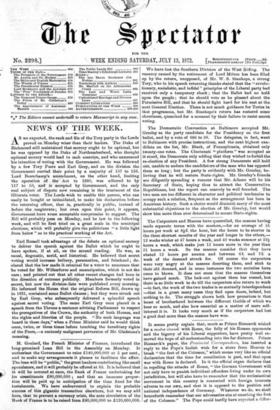The Carpenters and Masons have quarrelled, the masons having made
separate terms with the masters,—for an average of 51 hours per week at 81d. the hour, but the hours to be shorter in the three shortest months of the year and longer in the others,- 12 weeks winter at 47 hours a week, and 40 weeks summer at 521 hours a week, which make just 12 hours more in the year than 51 hours a week. So the masons consider that they have abated 12 hours per annum and between 61. and 7d. a week of the demand struck for. Of course the carpenters were very angry at the masons deserting them, and stick to their old demand, and in some instances the two societies have come to blows. It does not seem that the masons themselves have gained much. The lock-out against them has ceased, but there is so little work to do till the carpenters also return to work —in fact, the work of the two trades is so mutually interdependent —that in a great many cases they find open doors, indeed, but nothing to do. The struggle shows both how precarious is that boast of brotherhood between the different Guilds of which we hear so much, and also how essential as a matter of mere self- interest it is. It looks very much as if the carpenters had lost a good deal more than the masons have won.


































